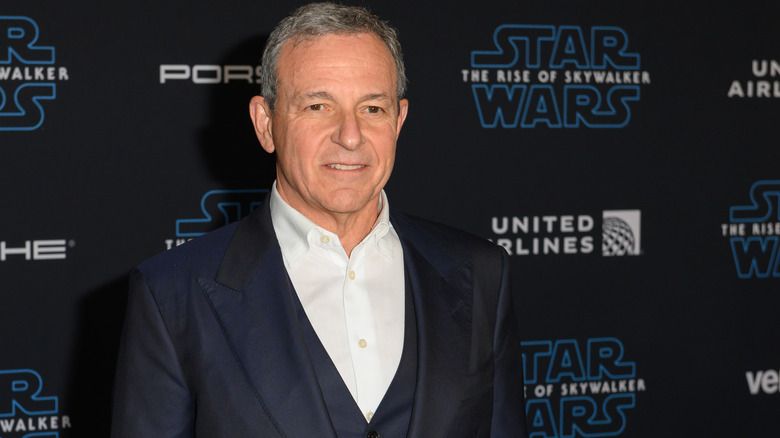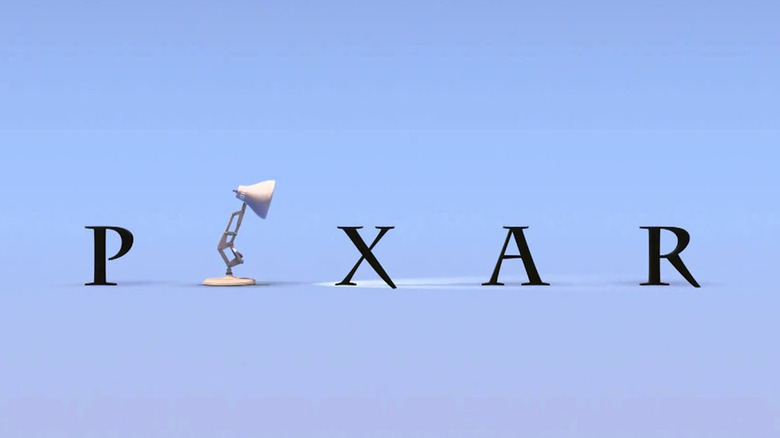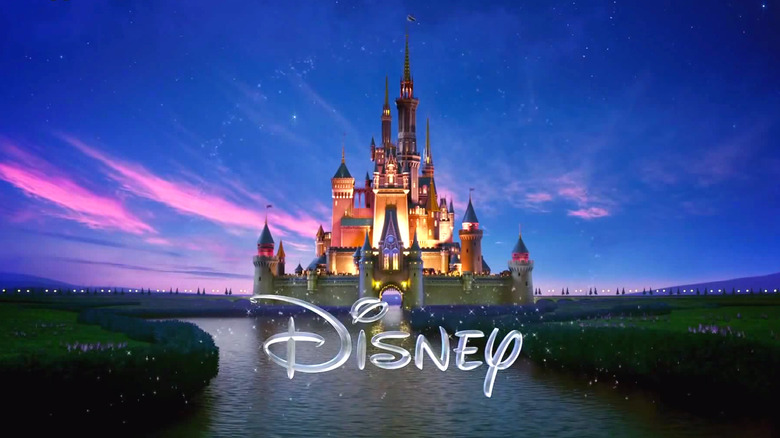A Brief History Of Bob Iger's (Sometimes Controversial) Corporate Leadership At Disney, And What His Return Means
A well-liked executive with a lengthy history at the Walt Disney Company is called upon to serve as its CEO after a public fracas resulted in troubled shareholders and concerns about the company's future legacy. When the executive is installed as the CEO, those public concerns quickly dissipate and are replaced by pleased reactions from Wall Street and Disney fans. The executive is, as you may have guessed, Robert Iger. The year? Why, 2005, of course. No, you have not traveled back in time — but history is genuinely, inexplicably repeating itself again. On the Sunday night before Thanksgiving 2022, industry watchers were legitimately stunned by the one-two punch: Disney's current CEO, Bob Chapek, was being ousted, and his replacement was Bob Iger, the man who literally chose Chapek to replace him as CEO. Iger has the advantage of weathering 15 years as the CEO of the House of Mouse, which may help or hurt him in his new/old gig.
Save Disney, the world asks Iger
First, a brief primer on the story alluded to in the opening story. Bob Iger rose up the ranks of the American Broadcasting Company — you know, ABC — throughout the 1980s and 1990s. Even before he joined the Walt Disney Company (when Disney purchased ABC's parent company Capital Cities in 1995), Iger was well-known among the most passionate of TV fans for having been the man who a) greenlit the influential TV drama "Twin Peaks" and b) canceled the influential TV drama "Twin Peaks." But Iger swiftly aimed higher with his ambitions once ABC became a part of Disney proper. After serving as ABC's chairman for four years, Iger was bumped up to serve as the second-in-command to Disney CEO Michael Eisner in the year 2000, as president and chief operating officer. You might presume that being installed as Eisner's number-two meant Iger was well-respected by his boss, and one specific source on the subject — the essential book "DisneyWar" by James B. Stewart — would clarify that you would be wrong.
As Stewart wrote, Iger had to "overcome Eisner's deep-seated anxiety about being upstaged by a strong number two," and had to deal with various slights by Eisner during their joint time at the studio. But Iger didn't so much take over at Disney because Eisner rode off into the sunset, as much as take over a potentially sinking ship when the captain was removed by force. In the early 2000s, Roy E. Disney — the nephew of Uncle Walt himself — was still alive and kicking, and particularly incensed about the way Eisner was running his family company. ("DisneyWar," it should be noted, is a genuinely invaluable resource on the subject.)
So Disney, near the end of 2003, resigned from the company bearing his name and issued a very public, very blunt letter about the poor management of Michael Eisner. The next year, he would, along with former Disney board member Stanley Gold, kickstart a public campaign and website, named "save Disney," in the hopes of ousting Eisner. When the 2004 shareholders' meeting resulted in 43 percent of shareholders voting against Eisner being re-elected to the board of directors. It was a sign that Eisner's time was limited, with his successor being that strong number two: Iger.
Mergers and acquisitions
One of the many strange ways in which Eisner manifested his leadership in the early 2000s was by antagonizing one of the surefire successes the company had: its partnership with Pixar Animation Studios. (In one story captured in "DisneyWar," Eisner bragged to the shareholders in one letter that Pixar had finally created its first sure-to-be flop and would be brought down to earth soon enough. That film was "Finding Nemo", which grossed nearly $350 million domestically. Oops.) Bob Iger, within less than six months of being officially installed as Disney's CEO, announced that Disney was purchasing Pixar for $7.4 billion, ensuring that the studio — whose distribution agreement was coming to a close — would not work with a competitor but be part of the House of Mouse. It's now hard to imagine a version of Disney that doesn't include Pixar, but that kind of successful acquisition was part and parcel of Iger's initial tenure as CEO.
The current state of the company now is fully tied up in its ownership of Pixar, Marvel Studios, and Lucasfilm, all of which are acquisitions that Iger helped engineer. And it's not just that these acquisitions were huge for Disney. Consider the vast impact — good or bad, depending on how you look at it — of the Marvel Cinematic Universe. Though the MCU began before Disney bought Marvel, with the 2008 film "Iron Man" being released under the auspices of Paramount Pictures, the overall success of the MCU at the box office domestically and worldwide is a success that lands at Bob Iger's feet as much as at anyone else's.
One of the arguably less successful deals, and one that received a good deal more pushback from some critics, was Disney's merger with what was once 20th Century Fox. Though a few titles and notable bits of intellectual property have survived the Disney/Fox merger — most important of all is the "Avatar" franchise, which is finally getting a sequel next month with "The Way of Water" — Disney's purchase of Fox seems to have mostly stripped the historic film studio for parts, turning the Big Six film studios of Hollywood into the Big Five. And even Iger's engineered acquisition of Pixar has, over time, come with a cost. When Variety reported on allegations of sexual harassment against John Lasseter in November 2017, the report quoted a source regarding the question of who knew about Lasseter's alleged misdeeds: "It has gone all the way to the top. I know personally that Bob was aware ... Everybody was aware. They just didn't do anything about it."
A capstone year
But Bob Iger's initial tenure at Disney as CEO was largely one of overall success. The theme parks grew and expanded in his 15-year term, Pixar became a juggernaut beyond belief, and by bringing in Lasseter, Iger was able to help steer the ship around for Walt Disney Animation Studios. Though Iger was officially replaced by Bob Chapek on February 25, 2020, the year 2019 was the real celebratory year for Iger and the studio as a whole. 2019 was the year of "Toy Story 4", the year of Jon Favreau's computer-animated remake of "The Lion King," the year of "Frozen II", and the year of "Avengers: Endgame". It was a good time to go out on a high note. But the warning signs of trouble existed, even beyond the burgeoning pandemic that caused Chapek to close down the Disney theme parks a mere three weeks into his term as CEO.
2019 ended for Disney with "The Rise of Skywalker," a movie that everyone loves and no one holds any ill will against. Kidding aside, "The Rise of Skywalker" was the latest example of Lucasfilm's push for a new "Star Wars" film every year not bearing a ton of creative fruit, a year after the very troubled production of "Solo: A Star Wars Story." And while "Avengers: Endgame" was an unquestionably massive box-office hit, it also felt like such a resounding conclusion to the MCU as a whole that future entries haven't had quite the same foothold as the story wrapping up Tony Stark's arc as Iron Man did.
Iger did not have to worry about these problems when he left, but he does now. Initially, Bob Iger returning to the place where he became an internationally renowned figure is good news met with applause by stockholders and fans. But Bob Iger has work ahead of him, and the solutions — which seemed so extremely simple when he started as CEO in 2005 — are not quite so apparent. Can criticisms of Disney theme parks being too expensive for less value be resolved smoothly? Can Lucasfilm and Marvel get back on track? And will the CEO of the Walt Disney Company treat Pixar better? (Well, that one seems like a firm yes, compared to how Bob Chapek kicked Pixar films to streaming for no good reason.) Bob Iger can try to save Disney again, but the road ahead is a lot bumpier than it was the first go-round.



